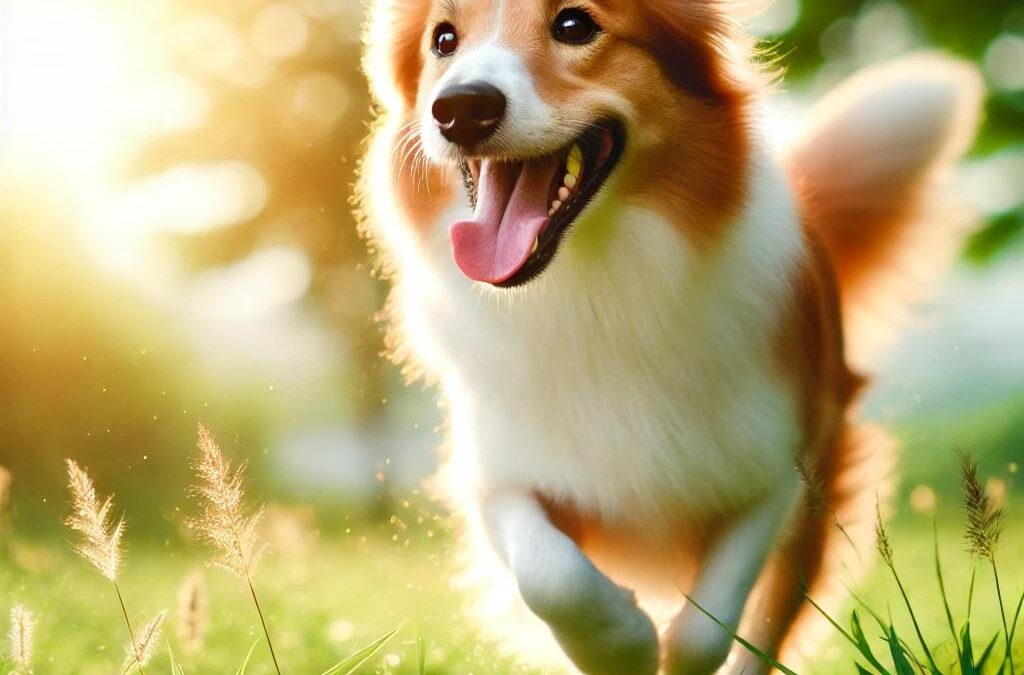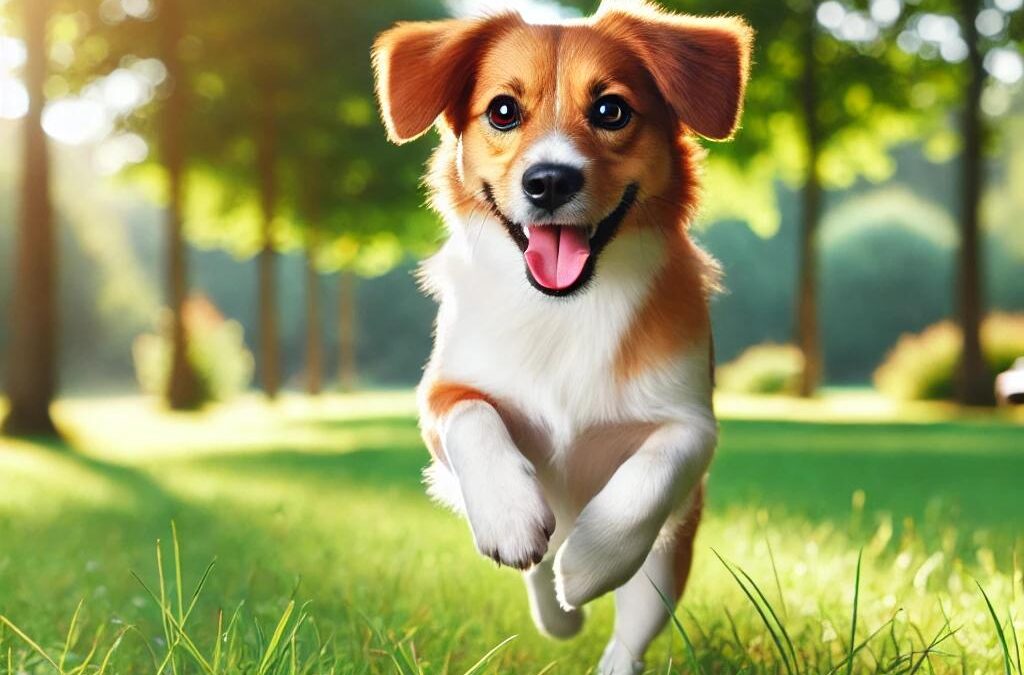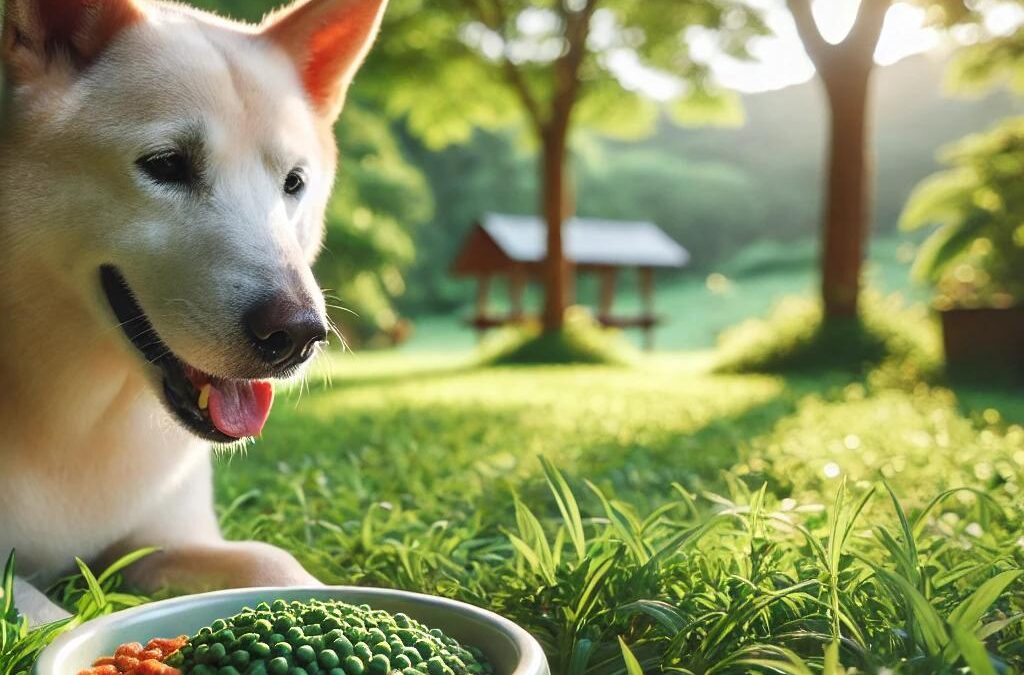
執筆者 TCMVET | 2024年10月15日 | 食と健康
断続的な嘔吐、軟便、過剰なガスなど、犬の消化器系の問題は、多くの飼い主にとって共通の懸念事項です。これらの問題は、食事の不均衡、根本的な健康問題、または個々の過敏症によって発生する可能性があります。犬の胃腸の不調の根本原因を特定することは、犬の全体的な健康と幸福を改善するために不可欠です。
犬の消化器疾患の一般的な食事原因
- 高脂肪含有量
脂肪分が多すぎる食事は犬の消化器系に負担をかけ、軟便や嘔吐を引き起こす可能性があります。脂肪は消化されにくいため、胃が敏感な犬は脂肪を適切に処理するのに苦労することがあります。脂肪の摂取を減らし、より脂肪分の少ないタンパク質源を選ぶと、消化器系の問題を緩和できる可能性があります。
- 食物繊維不足
食物繊維は、定期的な排便を促進し、腸の健康をサポートすることで、健康的な消化を維持する上で重要な役割を果たします。食物繊維が不足した食事は、便通の乱れや消化不良につながる可能性があります。カボチャやサツマイモなど、食物繊維が豊富な食材を加えることで、症状が緩和される可能性があります。
- 食物不耐性またはアレルギー
犬の中には、特に穀物、乳製品、特定のタンパク質(鶏肉や牛肉など)などの一般的なアレルゲンに対して、食物過敏症や不耐性を持つ犬もいます。除去食を通じて原因となる成分を特定することで、将来の消化不良を防ぐことができます。
- 食べ過ぎや早食い
食べるのが速すぎたり、大量の食べ物を摂取したりする犬は、膨満感や消化不良を起こすことがあります。パズルフィーダーや少量ずつの食事で食事時間をゆっくりにすると、これらの症状を軽減できます。
基礎疾患
食事は消化に大きな役割を果たしますが、他の健康状態も消化管の不調に寄与する可能性があります。 膵炎、細菌の異常増殖、または腸内寄生虫は、慢性的な消化器疾患を引き起こす可能性があります。症状が長引く場合は、獣医師に相談して基礎疾患を除外することが重要です。
胃腸が弱い犬に最適なフードの選び方
- 消化しやすい食材を選ぶ
赤身のタンパク質(七面鳥、羊肉、魚など)や玄米などの全粒穀物など、シンプルで高品質の原材料を含むドッグフードを選びましょう。これらは犬の胃に優しく、消化しやすいです。
- 制限成分ダイエット(LID)を探す
LID ドッグフードは原材料が少なく、食物過敏症やアレルギーを引き起こすリスクが軽減されています。高品質のタンパク質と限られた炭水化物源に重点を置いているため、胃が敏感な犬に最適です。
- プロバイオティクスとプレバイオティクスを検討する
犬の食事にプロバイオティクスを加えると、腸内細菌のバランスが整い、健康的な消化を促進できます。チコリの根やビートパルプなどの食品に含まれるプレバイオティクス繊維も、腸内の有益な細菌の増殖をサポートします。
- 人工添加物を避ける
人工保存料、着色料、香料を含むドッグフードは、消化の問題を悪化させる可能性があるため、避けてください。可能な限り、天然の保存料を含まないオプションを選択してください。
犬にはそれぞれ独自の食事ニーズがあり、ある犬に効くものが別の犬には適さないこともあります。消化器系の問題の一般的な原因を理解し、犬の食事に適切な変更を加えることで、消化器系の健康を大幅に改善することができます。特に犬に慢性的な消化器系の問題の兆候が見られる場合は、食事を大幅に変更する前に必ず獣医に相談してください。

執筆者 TCMVET | 2024年10月13日 | 食と健康
ペットの飼い主として、私たちは愛するペットが長く健康で幸せな生活を送ってほしいと願っています。伝統的な獣医治療の他に、ペットの健康を促進するために自然で総合的な方法に目を向ける人が増えています。このアプローチには、バランスの取れた栄養やハーブサプリメントからストレスのない環境づくりまで、あらゆることが含まれます。この記事では、ペットの健康に対する総合的なアプローチとして、伝統的な中国医学 (TCM)、自然療法、ライフスタイルの変化の利点を取り入れ、ペットの健康を高めるさまざまな自然な方法を紹介します。
ペットにとってホリスティックヘルスが重要な理由
ホリスティック ペット ケアは、症状だけに焦点を当てるのではなく、動物の体、心、精神全体に注目します。自然療法と適切な栄養、定期的な運動を組み合わせることで、健康上の問題が発生する前に予防し、ペットの全体的な生活の質を向上させることができます。ホリスティック ケアは、ペットの免疫システムを強化し、長期的な健康をサポートし、ストレスや不安を軽減することもできます。
自然なペットケアルーチンの重要な要素
- 自然でバランスのとれた栄養
適切な栄養はペットの健康的な生活の基盤です。自然食品、赤身のタンパク質、必須栄養素が豊富な食事を与えることで、ペットのエネルギーと免疫力を高めることができます。
- ホールフーズ: ニンジン、ブルーベリー、サツマイモなどの新鮮な野菜や果物をペットの食事に取り入れましょう。
- 赤身のタンパク質筋肉の維持と全体的な活力に必要な必須アミノ酸を提供する鶏肉、七面鳥、魚などの高品質の肉を選びましょう。
- 健康的な脂肪: 魚油や亜麻仁に含まれるオメガ 3 脂肪酸とオメガ 6 脂肪酸を摂取して、光沢のある毛並み、脳の健康、関節機能をサポートします。
- 健康をサポートするハーブサプリメント
ハーブ療法は、ペットの健康をサポートする優れた自然な方法です。伝統中国医学 (TCM) や西洋薬草療法で使用される多くのハーブには、炎症を軽減し、免疫力を高め、不安を和らげるなどの効果があります。
- ターメリック抗炎症作用があることで知られるターメリックは、関節炎の痛みを軽減し、関節の健康を促進します。
- カモミールこのハーブは、消化器系の問題を緩和し、不安なペットを落ち着かせるのに最適です。
- 地黄(ジホアン): 中医学で使用されるこのハーブは、血液に栄養を与え、腎臓の健康をサポートするため、高齢のペットに最適です。
- ショウガ: 生姜は天然の吐き気止めハーブで、胃の調子が悪いペットに最適で、健康的な消化を促進します。
- ペットのための伝統中国医学(TCM)
伝統的な中国医学は、体の気(エネルギー)のバランスを整え、体内の調和を促進することで、健康に対する総合的なアプローチを提供します。TCM は、ペットの慢性疾患を治療し、自然治癒力を高めるためによく使用されます。
- 四川ラビッジ(チュアンシオン)このハーブは、特に関節痛や関節炎のあるペットの血行を促進し、痛みを軽減し、炎症を和らげる効果があります。
- スイカズラ(金銀花): 抗炎症作用と抗菌作用を持つスイカズラは、体内の熱や毒素を除去し、感染症や皮膚疾患のあるペットを助けるために使用されます。
- ハトムギ(黄耆): アストラガルスは免疫システムを強化し、肝臓をサポートし、エネルギーレベルを高めます。全体的な活力の予防策としてよく使用されます。
- 運動と精神刺激
定期的な運動は、ペットを健康に保つために不可欠です。運動は心臓血管の健康をサポートし、筋肉の緊張を維持し、肥満を防ぎます。しかし、精神的な刺激も同様に重要です。ペットの精神を鋭敏に保つことで、退屈や破壊的な行動を防ぐことができます。
- 毎日の散歩: 健康的な体重と強い筋肉を維持するために、犬が 1 日に少なくとも 30 分間運動するようにしてください。
- インタラクティブ玩具: パズルおもちゃやトレーニング ゲームでペットの知性を刺激します。猫は羽根のおもちゃを楽しみ、犬はボールを投げたりおやつを出すおもちゃを好むかもしれません。
- ストレス軽減と穏やかな環境づくり
人間と同じように、ペットもストレスを感じます。慢性的なストレスは、ペットの免疫システム、消化、全体的な気分に影響を及ぼす可能性があります。落ち着いた環境を作り、ペットの不安を軽減することで、ペットの健康を大幅に向上させることができます。
- アロマテラピー: ラベンダーやカモミールなどの心を落ち着かせる香りを使って、落ち着いた環境を作りましょう。エッセンシャル オイルは不安なペットをリラックスさせるのに役立ちますが、ペットにとって安全なものであることを確認してください。
- ルーチンと一貫性: ペットは規則正しい生活を送ります。定期的な食事、遊び、休息のスケジュールは、ストレスを軽減し、安心感を与えるのに役立ちます。
- 天然鎮静剤CBD オイル、バレリアンの根、救急治療薬などの天然製品は、特に獣医の診察や雷雨などのストレスの多い出来事の際に、不安を抱えたペットを落ち着かせるのに役立ちます。
高齢ペットのためのホリスティックヘルス
ペットは年をとるにつれて、ニーズも変化します。ホリスティックケアは、高齢ペットの生活の質を向上させる上で重要な役割を果たします。関節サプリメント、抗酸化物質を豊富に含む食品、腎臓と肝臓の機能をサポートするハーブは、大きな違いをもたらします。
- グルコサミンとコンドロイチンこれらのサプリメントは、高齢のペットの関節の健康を維持し、関節炎の痛みを和らげるのに役立ちます。
- 抗酸化物質が豊富な食品ブルーベリー、クランベリー、ほうれん草には、フリーラジカルと戦い、加齢に伴う病気のリスクを軽減する抗酸化物質が豊富に含まれています。
- ハーブサポート: ハーブ類 地黄 そして レンゲ ペットが年をとるにつれて特に弱くなる臓器である腎臓と肝臓に栄養を与え、強化します。
ペットの健康を自然に高めるには、適切な栄養、運動、ハーブによるサポート、ストレス軽減を組み合わせる必要があります。ペットのケアに総合的なアプローチを採用することで、犬や猫が今後何年にもわたって健康で幸せで、活力に満ちた状態を保つことができます。新しいハーブサプリメントを導入したり、ペットの習慣を変えたりする前には、必ず獣医師に相談してください。特に、既往症のあるペットの場合は注意が必要です。

執筆者 TCMVET | 2024年10月12日 | 食と健康
猫が癌と診断された場合、適切な栄養を与えることがケアの重要な部分になります。猫は食習慣が偏食なことで知られていますが、病気の際の特定のニーズに合わせた食事は、猫の健康を支え、生活の質を向上させるのに大きな違いをもたらします。ここでは、癌と闘う猫に必要な栄養素を確実に摂取するための重要なヒントをいくつか紹介します。
1. 高品質で消化しやすいタンパク質に注目
がんを患っている猫は、筋肉量とエネルギー レベルを維持するために、高品質のタンパク質を必要とします。消化器系に余分な負担をかけずに必要な栄養素を摂取できる、魚、鶏肉、七面鳥などの消化しやすいタンパク質源を選んでください。タンパク質は猫が健康を維持し、がんの悪影響と戦うのに役立ちます。
2. 低炭水化物、高脂肪
炭水化物は癌細胞の増殖を促進する可能性があるため、猫の食事では炭水化物の摂取量を減らすのが最善です。代わりに、エネルギーを供給し、体重の維持に役立つ健康的な脂肪に焦点を当ててください。魚油に含まれるオメガ 3 脂肪酸は、特に抗炎症作用があり、免疫システムをサポートし、炎症を軽減する効果があります。
3. 少量の食事を頻繁に摂る
がんを患っている猫は、治療中に食欲不振や吐き気を経験することがあります。少量の食事を頻繁に与えると、猫に負担をかけずに食べるよう促すことができます。猫が食べ物への興味を維持できない場合は、匂いを強めてより魅力的にするために、少し温めてみてください。
4. 抗酸化物質で食生活を強化する
抗酸化物質は体の細胞を損傷から守るのに役立ちます。これは癌治療には不可欠です。ベリー類などの抗酸化物質を豊富に含む食品を摂取したり、ビタミン C や E を補給すると、猫の免疫システムをサポートするのに役立ちます。ただし、新しい食品やサプリメントを与える前には必ず獣医に相談してください。
5. 水分補給が鍵
がんやその治療は脱水症状を引き起こす可能性があるため、猫に水分を補給することが重要です。ウェットフードは水分補給と栄養補給の両方を提供し、また、猫の食事に低ナトリウムのスープを加えて水分摂取を促すこともできます。適切な水分補給は、腎臓機能と全体的な健康をサポートします。
6. 獣医師に相談して、自分に合ったサプリメントを選ぶ
オメガ 3 脂肪酸、プロバイオティクス、消化酵素などの特定のサプリメントは、がん治療中の猫の健康維持に役立ちます。ただし、猫によって必要なものは異なるため、獣医師と協力して猫に適切なサプリメントと投与量を決定することが重要です。
7. 猫の体重と状態を監視する
がん治療中は、猫の体重と体調を定期的に監視することが重要です。猫は病気と闘っているときに急速に体重が減ることがあるので、変化するニーズに合わせて食事を調整することが大切です。体重減少が問題になる場合は、獣医師が特定の高カロリー食品やサプリメントを勧めることがあります。
がんを患う猫の世話には、食事に関して細心の注意が必要です。高品質のタンパク質に重点を置き、炭水化物を最小限に抑え、健康的な脂肪と抗酸化物質を取り入れることで、猫の全体的な健康をサポートするのに大きな違いが生まれます。必ず獣医師に相談して、猫の独自のニーズに対応し、治療中にできるだけ健康で快適に過ごせるように、個別の栄養プランを作成してください。

執筆者 TCMVET | 2024年10月12日 | 食と健康
多くの猫や犬は、大きな音、嵐、見知らぬ人、または他の動物にさらされると、不安やストレスを感じます。ペットの飼い主として、愛するペットがそのような苦痛を感じているのを見るのは辛いことですが、幸いなことに、ペットの不安を和らげるのに役立つ自然で安全な解決策があります。トレーニング方法からホメオパシー療法まで、不安なペットをサポートする方法はさまざまです。
1. 服従訓練と運動
ペットの不安を管理する最も効果的な方法の 1 つは、服従訓練と定期的な運動です。訓練は規則正しい生活を作るのに役立ち、ペットに安心感を与えてストレスを軽減します。さらに、身体活動はエンドルフィンを放出し、落ち着きを促し、神経のエネルギーを減らします。
2. 集中玩具とクレートトレーニング
インタラクティブなおもちゃやパズルは、ペットの精神を刺激して不安から気をそらすことができます。また、クレート トレーニングは、雷雨や来客などのストレスの多い状況でペットが逃げ込める安全な場所を提供します。クレートは安心感を与え、ペットが危険にさらされていると感じるのを軽減します。
3. 声のトーン
ペットとの接し方は、ペットを落ち着かせるのに重要な役割を果たします。穏やかで落ち着いた口調で話すと、ペットにすべてがうまくいっていると安心させることができます。ペットは人間の感情に非常に敏感なので、声を荒らげたり、不安そうな態度を取ったりするのは避けてください。
4. ホメオパシー療法
ホメオパシー療法は、ペットの不安に対処する穏やかで自然な方法です。これらの療法は、一般的な不安に対処するために毎日使用しても安全であり、ストレスの多い出来事の際には高用量で投与できます。獣医の診察や花火など、ストレスの多い状況の前にホメオパシーを投与すると特に効果的です。ストレスがかかり始めるとペットを落ち着かせるのが難しくなる場合があるためです。
5. フラワーエッセンス
フラワーエッセンスは感情レベルで作用し、ペットのストレスや不安を軽減するのに非常に効果的です。これらの処方には、感情を落ち着かせることができる花のエネルギーエッセンスが含まれています。ペットは特にこれらのエネルギーベースの治療に反応し、フラワーエッセンスは穏やかで長期使用しても安全です。
6. ハーブ処方
ハーブ療法は、ホメオパシーやフラワーエッセンスよりも効果が遅いですが、効果が長く続きます。ハーブサプリメントを毎日摂取すると、時間の経過とともにストレスや不安が自然に軽減され、落ち着きが増します。
7. サンダーシャツ: ユニークなソリューション
サンダーシャツは、不安なペットのための独創的で実証済みのソリューションです。このぴったりフィットのシャツは、赤ちゃんをくるむときのように優しい圧力をかけ、ペットが安全で安心できるようにします。雷雨、花火、その他の不安を引き起こすイベントの際に特に役立ちます。
トレーニング、自然療法、サンダーシャツのようなユニークなツールなど、ペットの不安を和らげるのに役立つ安全で効果的なオプションはたくさんあります。積極的に行動し、サポート環境を提供することで、ストレスの多い状況でも猫や犬が落ち着き、安心できるようになります。

執筆者 TCMVET | 2024年10月12日 | 食と健康
健康な心臓は、ペットの全体的な健康にとって非常に重要です。心臓は休むことなく働き、平均して 1 分間に約 100 回鼓動し、酸素、栄養素、ホルモン、必須細胞が体全体に循環するようにしています。この重要な役割を考えると、ペットの飼い主は適切な栄養と定期的な運動を通じてペットの心臓の健康をサポートすることが重要です。
1. 定期的な運動:心臓を強く保つ
運動はペットの体重を維持するためだけのものではありません。心臓血管の健康に不可欠です。定期的な身体活動は心筋を強化し、血圧を調節し、循環を効率よく保ちます。犬の毎日の散歩でも、猫のインタラクティブな遊びでも、運動はペットの心臓と体を強く健康に保ちます。
2. 心臓に良い食事:長寿の鍵
ペットの食事は、心臓の健康を保つ上で最も重要な要素の 1 つです。ビタミン、栄養素、タンパク質が豊富な食事は、健康的な体重を維持し、炎症を軽減し、心臓機能をサポートします。トウモロコシ、小麦、大豆は猫や犬によく見られるアレルギー物質なので、ペットにこれらの食品を与えないようにしてください。野生のペットはこれらの穀物を決して食べません。多くのペットがアレルギー反応を起こし、嘔吐や下痢などの消化器系の問題を引き起こします。
さらに、多くのペットは鶏肉、七面鳥、アヒルなどのタンパク質にアレルギーがあります。これらのアレルギーは胃腸障害や炎症にもつながり、心臓の健康に悪影響を及ぼす可能性があります。アレルギー反応を引き起こす可能性が低い、高品質で種に適したタンパク質源を選択し、最適な食事オプションについて獣医に相談してください。
3. 一般的なアレルゲンを避ける: トウモロコシ、小麦、大豆、特定のタンパク質
責任あるペットの飼い主として、ペットの餌のラベルを注意深く読むことが重要です。トウモロコシ、小麦、大豆などの穀物ベースの増量剤は栄養価が低く、ペットにとって一般的なアレルゲンです。さらに、多くの加工ペットフードには家禽の副産物が含まれており、一部の動物ではアレルギー反応を引き起こす可能性があります。ペットの食事からこれらの成分を排除すると、炎症を軽減し、消化を改善し、心臓の健康全般をサポートします。
4. 心臓の健康のための栄養補助食品
バランスの取れた食事に加えて、心臓をサポートするサプリメントをペットの食事に取り入れることを検討してください。魚油に含まれるオメガ 3 脂肪酸は、炎症を軽減し、心臓血管機能をサポートすることが知られています。アミノ酸の 1 つであるタウリンは、心臓の筋肉の正常な機能をサポートするため、猫にとって特に重要です。ペットの食事にサプリメントを追加する前に、必ず獣医に相談して、適切な量の適切な栄養素を摂取していることを確認してください。
ペットに定期的な運動、一般的なアレルゲンを含まないバランスの取れた食事、適切なサプリメントを与えることで、ペットの心臓の健康をサポートし、長く健康的な生活を送ることができます。ペットの心臓は毎日懸命に働いていることを忘れないでください。必要な栄養面と身体面のサポートを与えるのは飼い主の責任です。

執筆者 TCMVET | 2024年10月11日 | 食と健康
犬が癌と診断された場合、健康的な体重を維持することが全体的なケア計画の重要な部分になります。癌は食欲不振、筋肉の消耗、体の代謝要求の増加などの要因により、体重減少につながることがよくあります。犬の体重を維持または増加させることで、生活の質が向上し、免疫機能が強化され、癌治療の効果が向上します。この記事では、癌にかかった犬の体重を増やし、維持するための実用的な戦略を探ります。
がんを患った犬の体重減少を理解する
癌に罹患した犬の体重減少は、いくつかの要因に起因します。
- 食欲減少化学療法や放射線療法などのがん治療は吐き気を引き起こし、犬の食欲を減退させる可能性があります。
- 癌性悪液質: この症状は、犬が十分なカロリーを摂取している場合でも、筋肉と脂肪の減少を引き起こします。悪液質は、がんが体内で引き起こす代謝の変化によって引き起こされます。
- カロリー必要量の増加: 体はがんと闘う際に多くのカロリーを燃焼することが多く、犬が体重を維持することが難しくなります。
これらの課題を考慮すると、適切な栄養とケアを提供することで、犬の健康と回復に大きな違いをもたらすことができます。
がんを患う犬の体重増加のための効果的な戦略
- 高品質、高カロリーの食事 体重増加を促進する最も効果的な方法の 1 つは、高カロリーで栄養価の高い食事を与えることです。給餌に重点を置きます。
- タンパク質が豊富な食品: タンパク質は筋肉量を維持するために不可欠ですが、がんにより筋肉量は急速に減少します。鶏肉、七面鳥、魚などの赤身の肉や、タンパク質が豊富な卵を選びましょう。
- 健康的な脂肪: 脂肪は濃縮されたカロリー源です。魚油や亜麻仁油に含まれるオメガ 3 脂肪酸は、炎症を軽減し、免疫の健康をサポートするので、癌に罹患した犬にとって特に有益です。
- 複合炭水化物: 癌細胞は糖分を栄養源として増殖することが多いため、癌を患っている犬は炭水化物を控えたほうが良い場合もありますが、サツマイモや玄米などの低血糖の選択肢を与えることで、血糖値を急上昇させることなくエネルギーを補給できます。
- 頻繁に少量ずつ食べる がん治療を受けている犬は食欲が減退していることがよくあります。少量の食事を頻繁に与えると、一日を通してより多く食べるようになります。犬に大量の食事を与えて圧倒させないようにし、代わりに食事の一貫性と質を重視してください。
- 体重増加のためのサプリメント 犬用に設計された体重増加サプリメントを食事に加えることを検討してください。これらは筋肉量をサポートするために、カロリーと必須栄養素を濃縮した供給源となります。獣医師は次のような製品を推奨する場合があります。
- ニュートリカル: エネルギーを高め、体重増加を促進するように設計された高カロリーサプリメント。
- 魚油オメガ3が豊富に含まれており、健康的な体重を維持し、炎症を軽減するのに役立ちます。
- プロバイオティクス: 腸の健康をサポートすることで、消化と栄養の吸収が改善され、犬の体重が増えやすくなります。
- Appetite Stimulants 犬の食欲が減退している場合は、食欲増進剤の使用について獣医に相談してください。 ミルタザピン または エンティス 犬にもっと食べるように促すために処方することができ、治療中の望ましくない体重減少を防ぐのに役立ちます。
- 自家製栄養強化食品 犬の飼い主の中には、高カロリーでありながら犬にとって魅力的な手作りの食事で成功を収めている人もいます。ここでは、犬に必要な栄養素を与えながら食欲を刺激するのに役立つアイデアをいくつか紹介します。
- 茹でた鶏肉または七面鳥: チキンブロスを少し加えて風味を高めます。
- 卵スクランブルエッグや軽く調理した卵は優れたタンパク質源です。
- カボチャまたはサツマイモ: 消化しやすく、栄養も豊富です。
- カッテージチーズまたはプレーンヨーグルト: 高タンパクで胃に優しい。
- 吐き気止め薬 がん治療では吐き気が起こることが多く、犬は食欲がなくなります。吐き気止めの薬には次のようなものがあります。 セレニア 吐き気や嘔吐を抑え、犬がもっと食べ、食欲を取り戻すよう促すことができます。
- ストレスを最小限に抑える ストレスは犬の食欲を減退させる可能性があるため、ペットのために静かで快適な環境を作ることが重要です。犬が邪魔されずに安心して食事ができる静かな空間を用意してください。穏やかなアクティビティやマッサージを取り入れたり、ペットと充実した時間を過ごしたりして不安を軽減し、食欲にも良い影響を与えることを検討してください。
犬の体重と成長のモニタリング
愛犬の体重と体調を定期的に監視することが重要です。毎週体重を量って進捗状況を追跡し、努力にもかかわらず体重が減り続ける場合は獣医に相談してください。さらに、エネルギー レベル、食欲、全体的な気分にも注意してください。これらは、選択した戦略がどの程度うまく機能しているかを示す指標となる可能性があります。
獣医師は、犬が十分な栄養を摂取していること、また癌治療が健康的な体重を維持する能力に影響を与えていないことを確認するために、定期的な血液検査を勧めることもあります。
がんを患っている犬の体重を維持または増加させることは、全体的な治療計画の重要な部分です。高品質の栄養に重点を置き、少量の食事を頻繁に与え、必要に応じて食欲増進剤やサプリメントを使用することで、犬の体重増加をサポートできます。がん治療中は常に獣医師と密接に協力し、犬の特定のニーズを満たすカスタマイズされた栄養計画を作成してください。






